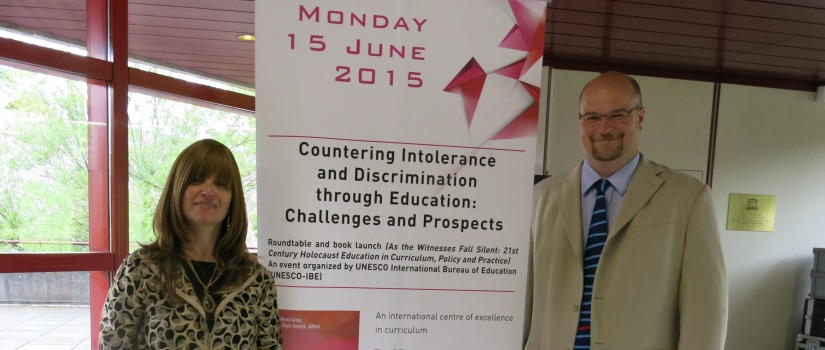On Monday, June 15, 2015, UNESCO’s International Bureau of Education (IBE) in Geneva, Switzerland organized a roundtable featuring USC College of Education Educational Leadership and Policies Associate Professor Dr. E. Doyle Stevick.
The UNESCO-IBE event, Countering Intolerance and Discrimination through Education: Challenges and Prospects, debuted the book As the Witnesses Fall Silent: 21st Century Holocaust Education in Curriculum, Policy and Practice by co-editors Dr. Stevick and Dr. Zehavit Gross, Bar-Ilan University Associate Professor.
The book is the broadest collection of empirical research on Holocaust education yet produced. Issues are framed by leading authorities in Holocaust education, including Elie Wiesel and Yehuda Bauer, and further explored by many distinguished scholars from around the world. The culmination of this research resulted in a book that concerns teaching about the Holocaust education in a global context.
Scholars from Israel, Germany, Austria, Switzerland, France, the United States, Australia, Finland, Scotland, the Netherlands and Canada explore international and comparative perspectives in this book through current research and good practice and policy in the field of curriculum and learning on Holocaust education. The theme of UNESCO-IBE’s event — countering intolerance and discrimination — offered a meaningful framework for the book launch, particularly following the 70th anniversary of the liberation of the Auschwitz concentration camp (January 27, 2015).
It has been ten years since the United Nations passed a resolution on Holocaust Remembrance, encouraging its member states to develop programs to educate future generations with the lessons that we must learn from the Holocaust in order to help prevent future acts of genocide.
Stevick says, “Holocaust education can sensitize learners to the nature of racism and the importance of speaking up against it. The recent tragedy in Charleston, South Carolina, where the murderous kind of racial thinking that spawned the Holocaust showed itself again, reminds us to take racist comments and jokes quite seriously, and not to let them pass unchallenged."
Gross and Stevick advocate that Holocaust education goes beyond historical instruction. It enhances global citizenship. “Teacher training matters,” says Gross. “We have to provide more in-service training for teachers, especially for this complicated issue, so that they can implement it practically in the classroom.” Through Holocaust education, Gross and Stevick explore how to construct a more responsible society.
“For teachers to facilitate the engagement of students with the history of the Holocaust,” says Stevick, “they need the support of both education experts and Holocaust scholars. These pedagogical interactions take place in a broader curricular and policy context. Policy makers, teacher trainers and curriculum experts need researchers in order to understand the particular challenges of the classroom, so that they can make adequate provision of curricular time and professional development. These dialogues, which are focused within national contexts, are only enriched by sharing policies, practices and materials across national boundaries, which allows the transfer of new ideas.”
This is not the first cooperative effort by Stevick and Gross. In 2010, they co-edited a double issue of PROSPECTS (Nos. 153 and 154) – UNESCO's Quarterly Review of Comparative Education. The articles in the first volume contribute empirical research about the actual policies and practice of Holocaust education and carry direct lessons from school and classroom practices not only for countries in Europe, but also for human rights and peace education worldwide. The second volume continues to reflect its authors’ practical and intellectual engagement with the implications of Holocaust education for human rights, multicultural, peace and civic education.
